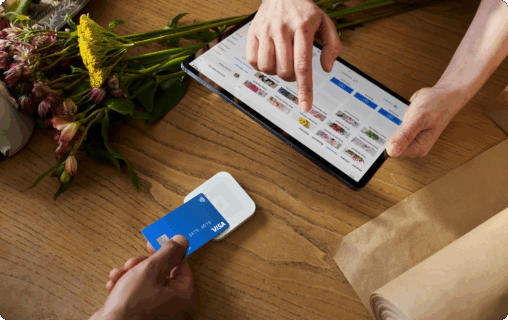Whether you're someone who tends to travel a lot, a frequent online shopper, or even just someone looking for a slightly more modern alternative to whoever you currently bank with, Revolut definitely has a lot to offer.
Despite being a relatively new company, founded in 2015, this is a service you should be paying attention to, because it's nothing like a regular bank.

This guide takes a closer look at how Revolut works and what it has to offer.
For a limited time, click here to get an exclusive CompareBanks deal when signing up for Revolut Business to get the first month of a paid plan free (T&Cs apply). This deal expires on June 30, 2025, so grab it while you can!
What Is Revolut?
Revolut isn't a traditional high street bank, rather it's a financial technology company. It doesn't currently have a UK banking licence, but it is authorised by the Financial Conduct Authority (FCA).
You can open and manage your Revolut account via the mobile app and this will also enable you to track and monitor your spending.
The account comes with a prepaid card, but one of the biggest perks is that you can exchange currencies with ease and save money when you use your Revolut card abroad.
The Revolut App
The Revolut app enables you to bank on the go, but it also offers a range of benefits including budgeting tools to help you keep track of your spending and set savings goals. You can create so-called “pockets” that let you set aside funds for different purposes, whether that's household bills or a holiday. You'll also be able to carry out currency exchange and transfer money overseas, plus carry out a host of other transactions in the app.
Revolut Card — Fee-Free Foreign Transactions
As touched on earlier, once you've opened a Revolut account, you'll receive a prepaid card for all your spending needs. You can set up spending limits to help ensure you don't spend more than you can afford and even opt for a one-use virtual card to help you shop securely online.
As well as spending in the UK, you can spend on your card and withdraw cash overseas and no fees will be charged, provided you stay within your monthly allowance and carry out transactions on a weekday. Your monthly allowance will depend on the plan you've chosen. There are five plans available, one of which has no monthly fee.
If you exceed your allowance or carry out transactions on a weekend, fees will apply.
How It Works
Let's take a more detailed look at how Revolut works.
1. Choose Your Plan
If you're choosing a personal account, you have five pricing plans to choose from. One of these is free (the Standard plan), but the others charge a monthly fee. The Plus account is £3.99 a month, the Premium account £7.99 a month, the Metal account charges £14.99 a month and the Ultra account £45 a month.
Compare them carefully to see what meets your needs best. Some of the paid-for plans offer added perks such as winter sports insurance, delayed flight or lost luggage cover and personal liability insurance, but of course, you might not want or need these. They also offer different monthly allowances for fee-free ATM withdrawals and fee-free currency exchange.
2. Signing Up
Once you've selected your plan, signing up with Revolut is generally a straightforward process. You'll need to download the app from either the App Store or Google Play Store, where you'll then be prompted to follow a few on-screen instructions and enter some personal details — don't worry, though, the app is highly secure, as we'll come onto later.
At this stage, the app will walk you through the necessary process for verifying your identity. Once this is completed, which can take 24 hours or more, you can wait for your new physical card to arrive. This should be within 10 days.
3. Adding Funds
Once you're set up, you'll need to add funds to your account. This can be done through various different methods, whether you prefer bank transfers or another financial platform like PayPal, for instance.
Again, the app comes with a pretty clear interface for adding funds in multiple different currencies, so the whole experience is relatively stress-free and shouldn't require too much time to complete.
4. Making Transactions
You can use your Revolut card to make purchases and withdraw cash both in the UK and overseas. Your app's transaction history will instantly be updated so you'll know what you've spent where. You can also send bank transfers to other accounts with ease, whether they are in the UK or abroad.
5. Budgeting and Analytics
This leads nicely to the budgeting and analytics features in the app. As you spend from your account, you'll be able to categorise that spending and then analyse your daily, weekly and monthly spending habits.
You'll also be able to set spending limits through the app, to help you stay in control of your finances.
6. Cryptocurrency Transactions
Another potential perk of using Revolut is that it's easy to dip your toe into the world of cryptocurrency and buy, sell, or hold digital assets.
Naturally, there are quite a lot of concerns about the safety and legitimacy of many cryptocurrency platforms, so the majority of banks or building societies out there don't offer any kind of crypto-related services.
As a result, this is definitely one of the more noteworthy features you can expect with Revolut, as being able to monitor and make adjustments to your cryptocurrency portfolio directly from the app can be incredibly convenient.
7. Security Measures
Revolut has a sophisticated fraud prevention system to flag any high-risk transactions and also provides two-factor authentication when logging into the web app. Through the app, you can quickly freeze your card if you misplace it, and unfreeze it again when found.
Naturally, these kinds of measures can give you some peace of mind about using Revolut, especially if you might deposit a large sum into your account — whether it's through regular currency or crypto holdings.
Is Revolut a Bank?
As mentioned earlier, Revolut does not currently have a UK banking licence, so it's not a bank in the UK. However, it is working to change this.
At the moment, Revolut offers e-money services to UK customers. Under the Electronic Money Regulations, you must hold your money in a safeguarded account with a regulated bank to ensure your savings are safe.
Neobank Distinction
Just to provide a little bit more context on this topic, let's talk more about neobanks.
Put simply, these are usually regarded as a more modern, digital counterpart to your traditional bank, but they do often still have banking licences. This means your money will be protected up to £85,000 per person under the Financial Services Compensation Scheme (FSCS). It also means they can offer credit products, such as personal loans.
Revolut, on the other hand, is currently an electronic money institution. An e-money licence lets the provider offer payment services and some financial services products, but it can't operate as a bank or be covered by the FSCS.
Revolut Business Account — Beyond Personal Finance
As well as personal accounts, Revolut also offers business accounts – whether you're a freelancer, sole trader, partnership or limited company. Note that standard Revolut Business accounts are not suitable for sole traders, however, sole traders can get Revolut Pro accounts instead.
These work in a similar way to personal accounts but will offer tools and features that are more tailored towards business use.
Revolut offers a range of business accounts for companies. There are four pricing plans to choose from here starting at £10/month.
Some of the features of the Revolut Business Account are outlined below.
Simplified Expense Tracking
When you're running a business, whether you're a sole trader or a limited company, it's not always easy to keep track of your expenses and manage the books. But the Revolut Business Account helps to simplify this process within the app, providing you with expense tracking and updates in real-time.
Separating your business and personal banking transactions will make it a lot easier to help you keep on top of your business finances and make it less stressful when you come to file your tax return.
The account will also help you to create, send and track invoices.
International Transactions Made Easy
Many businesses work with clients from all over the world — naturally leading to plenty of international transactions and fees that can quickly build up.
The Revolut Business Account lets you hold multi-currency accounts and makes transferring money abroad much less stressful. Local and global transfers have very competitive rates. Send, receive, and exchange in 25+ currencies at the interbank rate (within allowance, during market hours; fees may be applicable). You can also choose how much you pay to buy and sell foreign currencies and easily set up automatic future exchanges.
As a result, this account can be particularly useful for anyone who tends to frequently send and receive payments globally.
Enhanced Financial Insights
Whether it's visualising all of the spending patterns you have or forecasting any future expenses, you'll get a much more comprehensive view of how your business spends and makes money with the Revolut app. As team members can also use your business account, you'll have a full view of all business spending across all cards used by your team. You can also control your team's spend and permissions from one place.
Cryptocurrency and Stock Market Trading With Revolut
Now that we've looked at what Revolut's personal and business accounts have to offer, let's take a closer look at what you can expect from the trading side of Revolut's platform — both for cryptocurrency and the stock market.
With Revolut, you're essentially able to start building an investment portfolio directly from the app. So, whether you're looking to get involved with certain crypto assets — like Bitcoin and Ethereum, for instance — or if stocks are more your thing, you'll be able to get started with just a few taps on your screen.
You'll have access to thousands of global company stocks and can start trading from just $1. As long as it's within your monthly allowance, you can benefit from commission-free trades. When it comes to crypto, you'll have more than 120 tokens to access. Fees apply.



